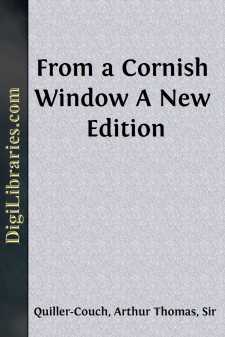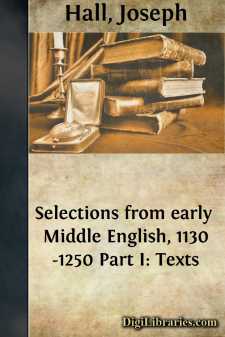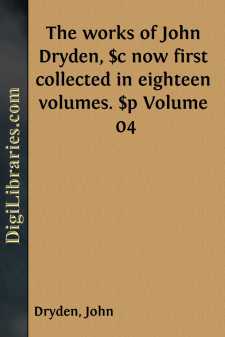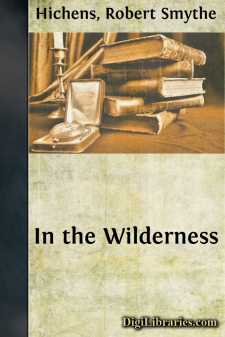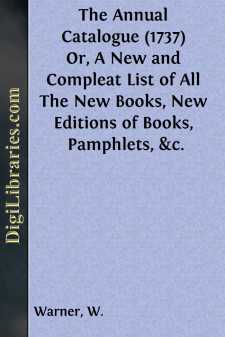Literary Collections
- American 84
- Ancient, Classical & Medieval 14
- Asian 1
- Australian & Oceanian 1
- Canadian 55
- Continental European 121
- English, Irish, Scottish, Welsh
- Essays 160
- General 24
- Letters 46
- Middle Eastern 1
English, Irish, Scottish, Welsh Books
Sort by:
DEDICATION. MY DEAR WILLIAM ARCHER, Severe and ruthlessly honest man that you are, you will find that the levities and the gravities of this book do not accord, and will say so. I plead only that they were written at intervals, and in part for recreation, during years in which their author has striven to maintain a cheerful mind while a popular philosophy which he believed to be cheap took possession...
more...
by:
Joseph Hall
No description available
by:
John Dryden
SCENE.—London. ACT I. SCENE I.—FAILER entering to BURR, who is putting on his buff-coat. Fail. What! not ready yet, man? Burr. You do not consider my voyage from Holland last night. Fail. Pish, a mere ferry; get up, get up: My cousin's maids will come and blanket thee anon; art thou not ashamed to lie a-bed so long? Burr. I may be more ashamed to rise; and so you'll say, dear heart, if...
more...
by:
Robert Ross
It is a common error to confuse the archæologist with the mere collector of ignoble trifles, equally pleased with an unusual postage stamp or a scarce example of an Italian primitive. Nor should the impertinent curiosity of local antiquaries, which sees in every disused chalk-pit traces of Roman civilisation, be compared with the rare predilection requisite for a nobler pursuit. The archæologist...
more...
by:
William Carleton
CHAPTER I.—A strong Farmer's Establishment and Family. It was one summer morning, about nine o'clock, when a little man, in the garb and trim of a mendicant, accompanied by a slender but rather handsome looking girl about sixteen, or it may be a year more, were upon their way to the house of a man, who, from his position in life, might be considered a wealthy agriculturist, and only a step...
more...
by:
John Dryden
THE CONQUEST OF GRANADA. This play,—for the two parts only constitute an entire drama betwixt them,—seems to have been a favourite with Dryden, as well as with the public. In the Essay upon Heroic Plays, as well as in the dedication, the character of Almanzor is dwelt upon with that degree of complacency which an author experiences in analyzing a successful effort of his genius. Unquestionably the...
more...
CHAPTER I. For the rest of the way Violet walked with Mrs. Scobel, and at the garden-gate of the Vicarage Roderick Vawdrey wished them both good-night, and tramped off, with his basket on his back and his rod on his shoulder, for the long walk to Briarwood. Here the children separated, and ran off to their scattered homes, dropping grateful bob-curtsies to the last—"louting," as they called...
more...
CHAPTER I Amedeo Dorini, the hall porter of the Hotel Cavour in Milan, stood on the pavement before the hotel one autumn afternoon in the year 1894, waiting for the omnibus, which had gone to the station, and which was now due to return, bearing—Amedeo hoped—a load of generously inclined travelers. During the years of his not unpleasant servitude Amedeo had become a student of human nature. He had...
more...
by:
W. Warner
Gallick Reports: Or, A Collection of Criminal Cases adjudg'd in the Courts of Judicature in France. In which is Comprized, An Account of Arnold du Tilh, an Impostor, who deceived a Man's Wife and Relations, and puzzled, for a long Time, the Parliament of France. Memoirs of the famous Madam de Brinvilliers, who poisoned her Father, and two Brothers, and attempted the Life of her Sister,...
more...
by:
George Gissing
CHAPTER I Seven years long had the armies of Justinian warred against the Goths in Italy. Victor from Rhegium to Ravenna, the great commander Belisarius had returned to the East, Carrying captive a Gothic king. The cities of the conquered land were garrisoned by barbarians of many tongues, who bore the name of Roman soldiers; the Italian people, brought low by slaughter, dearth, and plague, crouched...
more...


